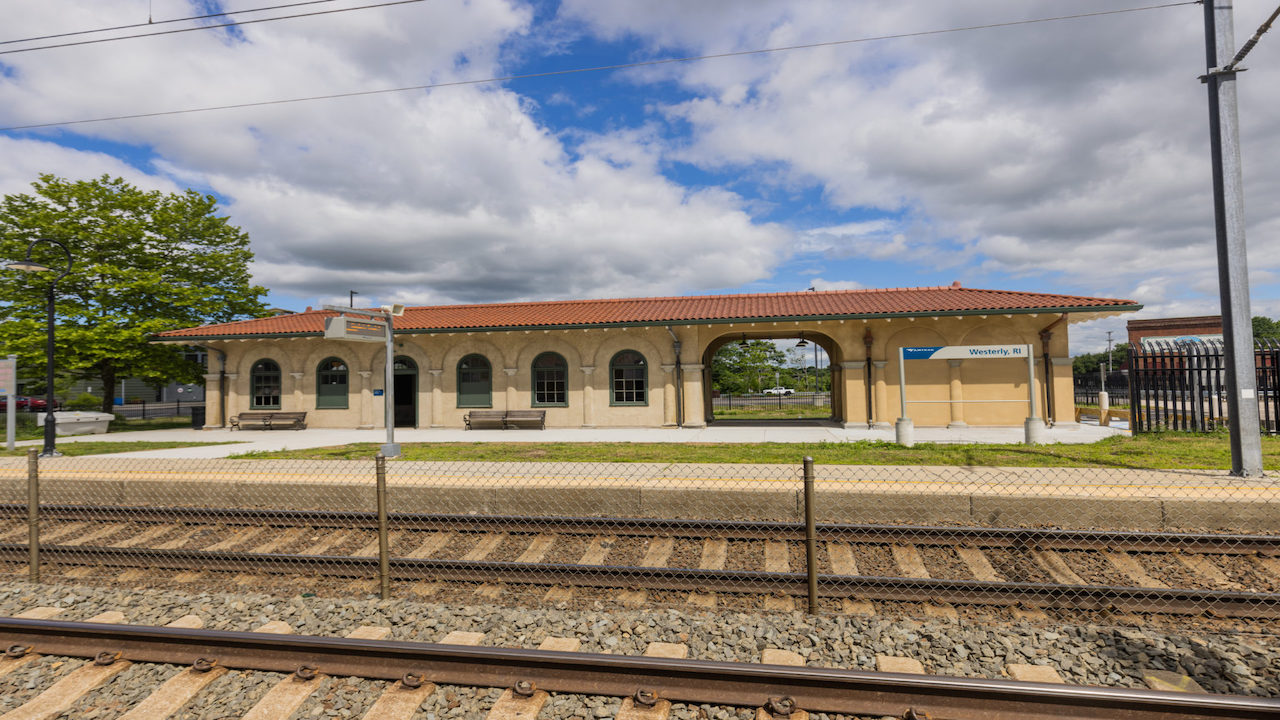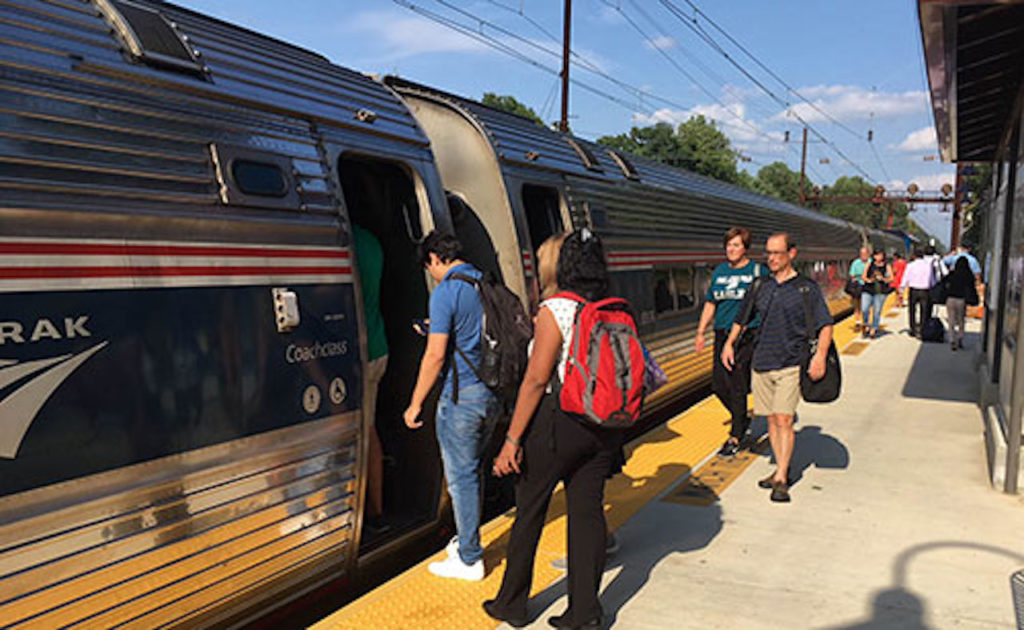
Passenger Rail Briefs: Amtrak, SRPRA, Metro Transit, NJ Transit, LA Metro
Written by Carolina Worrell, Senior Editor
Amtrak's Westerly, Rhode Island Station. (Photo by Marc Glucksman/River Rail Photo; Courtesy of Amtrak)
Amtrak and the Rhode Island Department of Transportation (RIDOT) partner to improve accessibility at Westerly Station in Rhode Island. Also, the Schuylkill River Passenger Authority (SRPRA) in Reading, Pa., held its first meeting; Metro Transit begins two-car train test; NJ Transit applauds advancement of new development near Hoboken Terminal; and LA Metro names new Chair of Board of Directors.
AMTRAK/RIDOT
Amtrak, in conjunction with RIDOT, announced on July 7 the completion of American Disabilities Act (ADA) improvements at Westerly Station in Westerly, R.I. This includes two new elevators featuring new elevator enclosures at platform level constructed in the style of the historic station; an accessible pathway to and from the public right-of-way; two accessible parking spaces; a new sloped walkway for accessing the platform, modified handrails, and guardrails; and new ADA compliant signs throughout the station environment.
“Accessibility is an essential component of Amtrak’s commitment to improving the customer experience at our stations and on our trains, and we thank our partners at RIDOT for their collaboration at achieving this goal at Westerly Station,” said Amtrak Vice President of Stations, Facilities, Properties and Accessibility Dr. David Handera. “Due to the investment from our federal partners, Rhode Island train travelers, residents and visitors now get to experience the improvements Amtrak has made at Westerly Station.”
“Westerly Station is an important part of our transit infrastructure,” RIDOT Director Peter Alviti said. “Just a few years ago we, the Town of Westerly and the Artists Cooperative Gallery of Westerly were able to breathe new life into this station and provide access to an indoor waiting area and restrooms while providing a unique community space for artists. These new improvements by Amtrak will make it easier for persons with disabilities to access this historic building.”
Construction on these improvements at Westerly Station began in March 2019, utilizing more than $9 million of federal funds that Amtrak receives from annual appropriations of Northeast Corridor (NEC) and National Network federal grants in compliance with ADA. These funds were used for every phase–demolition, design, and construction–of the project.
Amtrak continues to make significant progress in advancing its accessibility projects that will bring our facilities into full compliance. Since 2011, Amtrak has invested more than $489 million in accessibility upgrades at 204 stations throughout the country. In addition, Amtrak plans to spend more than $126 million in fiscal year 2022 on accessibility improvements at more than 43 additional stations. To date, Amtrak has made 168 stations ADA-compliant, and the work is continuing to address all areas for which Amtrak has responsibility.

SRPRA
On July 6, the Schuylkill River Passenger Rail Authority (SRPRA) held its first meeting since officially forming in late April to “forge ahead with making train service between Reading and Philadelphia a reality,” WFMZ-TV 69 News reported.
The inaugural meeting of SRPRA, which is comprised of Pennsylvania’s Berks, Chester and Montgomery Counties, dealt with such housekeeping items as electing officers, discussing consultants, finding a bank and insurance, creating subcommittees, and formally recognizing Amtrak as the operator of choice for the railway.
Although the creation of SRPRA is not a guarantee that passenger rail will return between the Reading-Philadelphia Corridor, the Authority says, it is a “necessary step in a long process of research and planning.” The three counties will need to reauthorize the authority in three years.
“Amtrak, on its long-term proposal, is looking at extension service from Scranton, from the Lehigh Valley and from Reading,” said Christian Leinbach, Chair of SRPRA and the Berks County Board of Commissioners. “I believe it is vital that we work together as three communities to be able to show Amtrak that this is the area they want to focus on.”
“In three years, it will force each county to look back and say is this still the right thing for Berks, is this right for Chester, is it right for Montgomery County,” Leinbach said. “Now that we know more about the financial impacts, we know about the opportunities, potential risks—we will have to make a decision.”
In addition to Leinbach, SRPRA elected officers include:
- Chester County Board of Commissioners Chair Marian Moskowitz – Vice Chair.
- Montgomery Court Board of Commissioners Vice Chair Kenneth Lawrence, Jr. – Treasurer.
- Montgomery County Planning Commission Executive Director Scott France – Secretary.
METRO TRANSIT
As part of its Safety & Security Action Plan, Metro Transit will be testing the use of two-car trains (versus three) on its Blue and Green Lines beginning July 9 and ending on August 20.
According to Metro Transit, the two-car test program will:
- Increase the likelihood that customers will observe a police officer or community service officer–a top priority for customers.
- Reduce wear and tear on light rail vehicles and relive some pressure on light rail vehicle maintenance and allow for proper cleaning while the departments are understaffed.
Adjustments may be made during the test program based on customer and staff feedback. After the test concludes, feedback and other evaluation measures will be considered to determine next steps.
NJ TRANSIT
NJ Transit and the Murphy Administration are applauding the City of Hoboken’s approval of a redevelopment agreement for significant new development and public infrastructure improvements near Hoboken’s historic train station. Hoboken’s City Council on July 6 approved a redevelopment agreement with LCOR Hoboken Rail Station Redevelopment LLC (LCOR) for the transformational project, Hoboken Connect, which, according to NJ Transit will “realize long sought-after new office space, retail and affordable housing, as well as improvements to the surrounding streetscape.” The project, which had stalled for 15 years, was jump started through cooperation between NJ Transit, LCOR, Hoboken and the State.
“The Governor and I are proud of this redevelopment in Hoboken and the economic benefits it brings,” said Acting Gov. Sheila Oliver. “The Murphy Administration is focused on strengthening our state from the inside out. We look forward to all the benefits the redevelopment project will bring to the Hoboken community and broader region.”
The project is a multi-phased initiative that will consist of private and public components implemented in coordination over the coming five plus years. When complete, the project will directly and indirectly support 15,290 permanent jobs and $234 million in tax revenue annually. The City of Hoboken will see 4,433 jobs on site with $9.6 million in annual retail spending and $4.5 million in annual revenue, while NJ Transit will benefit from substantial ground lease payments, increased ridership, and customer experience improvements. More than 9,800 construction jobs will be created.
The private phase includes a mixed-use residential building consisting of 389 apartment homes with 20% dedicated as affordable housing: a 20-story Class A office building with a rooftop terrace; 5,000 square feet of retail space; and related public open space investments, including additional pedestrian, vehicular and bicycle improvements.
Public investments will include construction of a new bus terminal on Hudson Place, significant rehabilitation of the first and second floors of the Ferry Terminal for commercial and exhibition space, the redevelopment of Warrington Plaza, and improvements to Hudson Place to support bicycle and pedestrian access to the transportation facilities. Gov. Murphy has committed $176 million in the FY23 state budget for the public improvement phase.

LA METRO
City of Glendale Councilmember Ara Najarian was announced on July 7 at Los Angeles Metropolitan Authority’s (Metro) annual State of the Agency as the new Chair of Metro’s Board of Directors. Najarian will succeed outgoing Board Chair Los Angeles County Supervisor Hilda L. Solis.
“I am honored to be selected and I am looking forward to leading the Metro Board over the coming year,” said Najarian. “We have a great number of exciting projects and initiatives coming to fruition in the coming year that will include the opening of both the Regional Connector Transit Project and the Crenshaw/LAX light rail line. In addition, I look forward to continuing to strengthen our commitment to public safety, growing ridership back to pre-pandemic levels, continuing to improve the customer experience and delivering more countywide, regionally integrated projects.”
During his first Chairmanship of the agency in 2014, Najarian, Metro says, was “instrumental in beginning construction and shepherding in the Regional Connector Transit Project and now as the current Board Chair will have come full circle from start to finish of this vital transportation project with its opening later this year.”
A practicing attorney, Najarian has served on Glendale’s City Council since 2005 and has held the position as Mayor of the City of Glendale four times during his tenure. He also serves as the Chair of Metrolink’s Board of Directors and is a member and past Chair of the San Fernando Valley Council of Governments and past Chair of the Glendale Housing Authority and Glendale Redevelopment Agency.
The Metro Board also voted to appoint Jacquelyn Dupont-Walker as the First Vice Chair and Los Angeles County Supervisor Janice Hahn as the Second Vice Chair.
As Metro’s new Board Chair, Najarian has appointed Chairs and Vice Chairs on six Metro Board Committees. They are:
- Finance, Budget and Audit Committee: Chair will be L.A. County Supervisor Kathryn Barger with L.A. County Supervisor Holly Mitchell as Vice Chair.
- Planning and Programming Committee: Chair will be Glendale Councilmember Ara Najarian with Los Angeles Mayor Eric Garcetti as Vice Chair.
- Operations, Safety, and Customer Experience Committee: Chair will be L.A. County Supervisor Holly Mitchell with Pomona Mayor Tim Sandoval as Vice Chair.
- Construction Committee: Chair will be Whittier City Councilmember Fernando Dutra with L.A. County Supervisor Janice Hahn as Vice Chair.
- Executive Management Committee: Chair will be Glendale Councilmember Ara Najarian with L.A. County Supervisor Janice Hahn as Vice Chair.
- 2028 Olympics Committee: Chair will be L.A. County Supervisor Hilda L. Solis with Glendale Councilmember Ara Najarian as Vice Chair.
The 13-member Board of Directors is comprised of the five Los Angeles County Supervisors, four members appointed by the Los Angeles County City Selection Committee and the Mayor of Los Angeles, and three members appointed by the Mayor. The position of Board Chair rotates between the three groups. Najarian’s term as Chair runs from July 1, 2022, through June 30, 2023.



